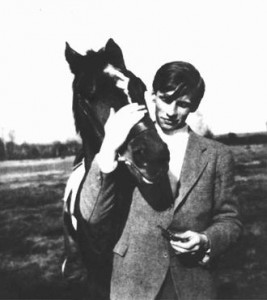I’ve reviewed two books by German writer Hans Fallada: Little Man, What Now?, and Wolf Among Wolves (the links go to the reviews), both of which were excellent. I recently finished his novel Every Man Dies Alone, which is centered on a couple who become anti-Nazi activists after their son Ottochen is killed in the war…it was inspired by, and is loosely based on, the true story of a real-life couple who distributed anti-Nazi postcards and were executed for it.
I thought this book was also excellent…the present post, though, is not a book review, but rather a development of some thoughts inspired by a particular passage in the story.
Trudel, who was Ottochen’s fiancee, is a sweet and intelligent girl who is strongly anti-Nazi..and unlike Ottochen’s parents, she became an activist prior to being struck by personal tragedy: she is a member of a resistance cell at the factory where she works. But she finds that she cannot stand the unending psychological strain of underground work–made even worse by the rigid and doctrinaire man (apparently a Communist) who is leader of the cell–and she drops out. Another member of the cell, who has long been in love with her, also finds that he is not built for such work, and drops out also.
After they marry and Trudel becomes pregnant, they decide to leave the politically hysterical environment of Berlin for a small town where–they believe–life will be freer and calmer.
Like many city dwellers, they’d had the mistaken belief that spying was only really bad in Berlin and that decency still prevailed in small towns. And like many city dwellers, they had made the painful discovery that recrimination, eavesdropping, and informing were ten times worse in small towns than in the big city. In a small town, everyone was fully exposed, you couldn’t ever disappear in the crowd. Personal circumstances were quickly ascertained, conversations with neighbors were practically unavoidable, and the way such conversations could be twisted was something they had already experienced in their own lives, to their chagrin.
Reading the above passage, I was struck by the thought that if we are now living in an “electronic village”…even a “global village,” as Marshall McLuhan put it several decades ago…then perhaps that also means we are facing some of the unpleasant characteristics that–as Fallada notes–can be a part of village life. And these characteristics aren’t something that appears only in eras of insane totalitarianism such as existed in Germany during the Nazi era. Peter Drucker, in Managing in the Next Society, wrote about the tension between liberty and community:
Rural society has been romanticized for millenia, especially in the West, where rural communities have usually been portrayed as idylic. However, the community in rural society is actually both compulsory and coercive…And that explains why, for millenia, the dream of rural people was to escape into the city. Stadluft macht frei (city air frees) says an old German proverb dating back to the eleventy or twelfth century.
